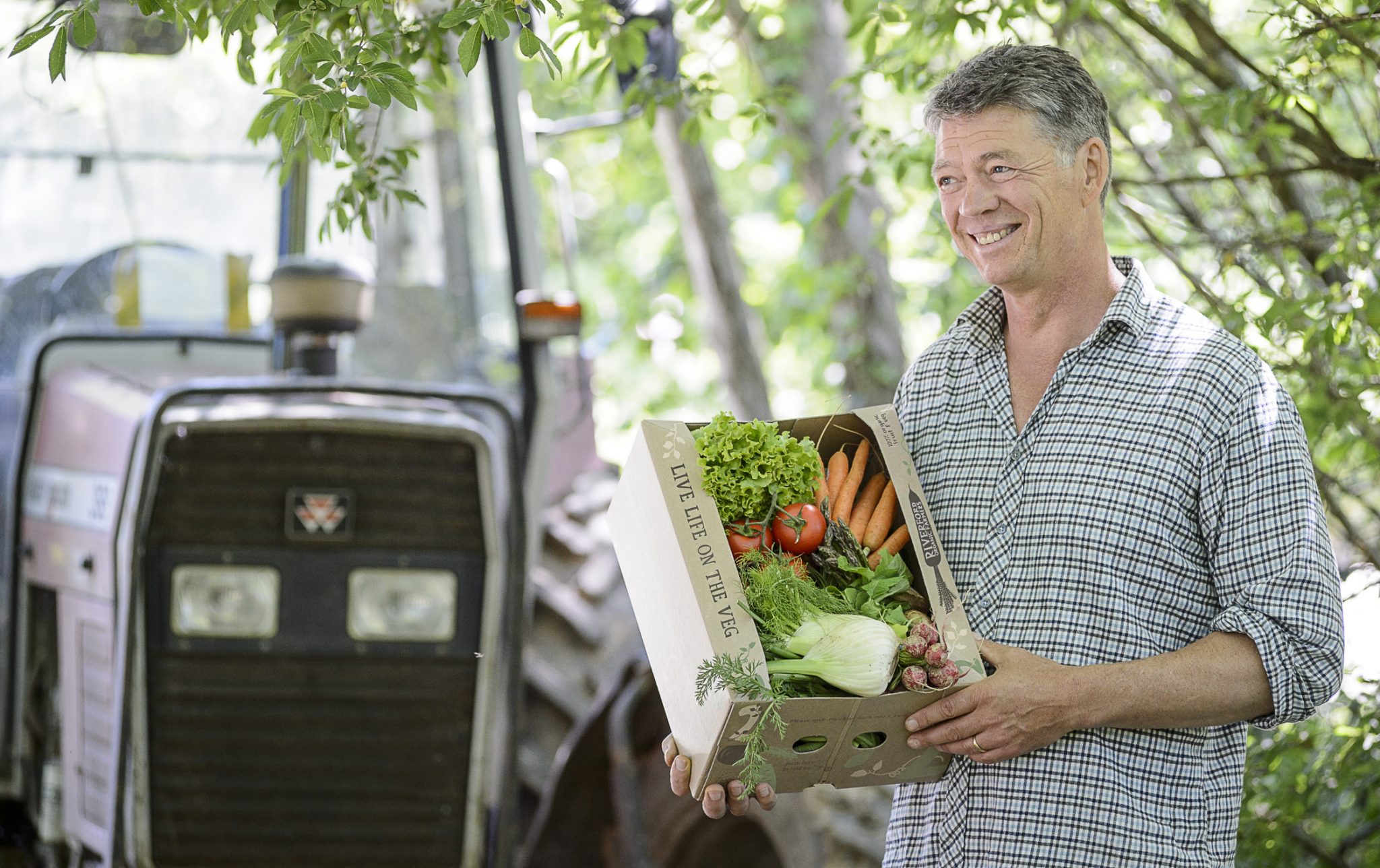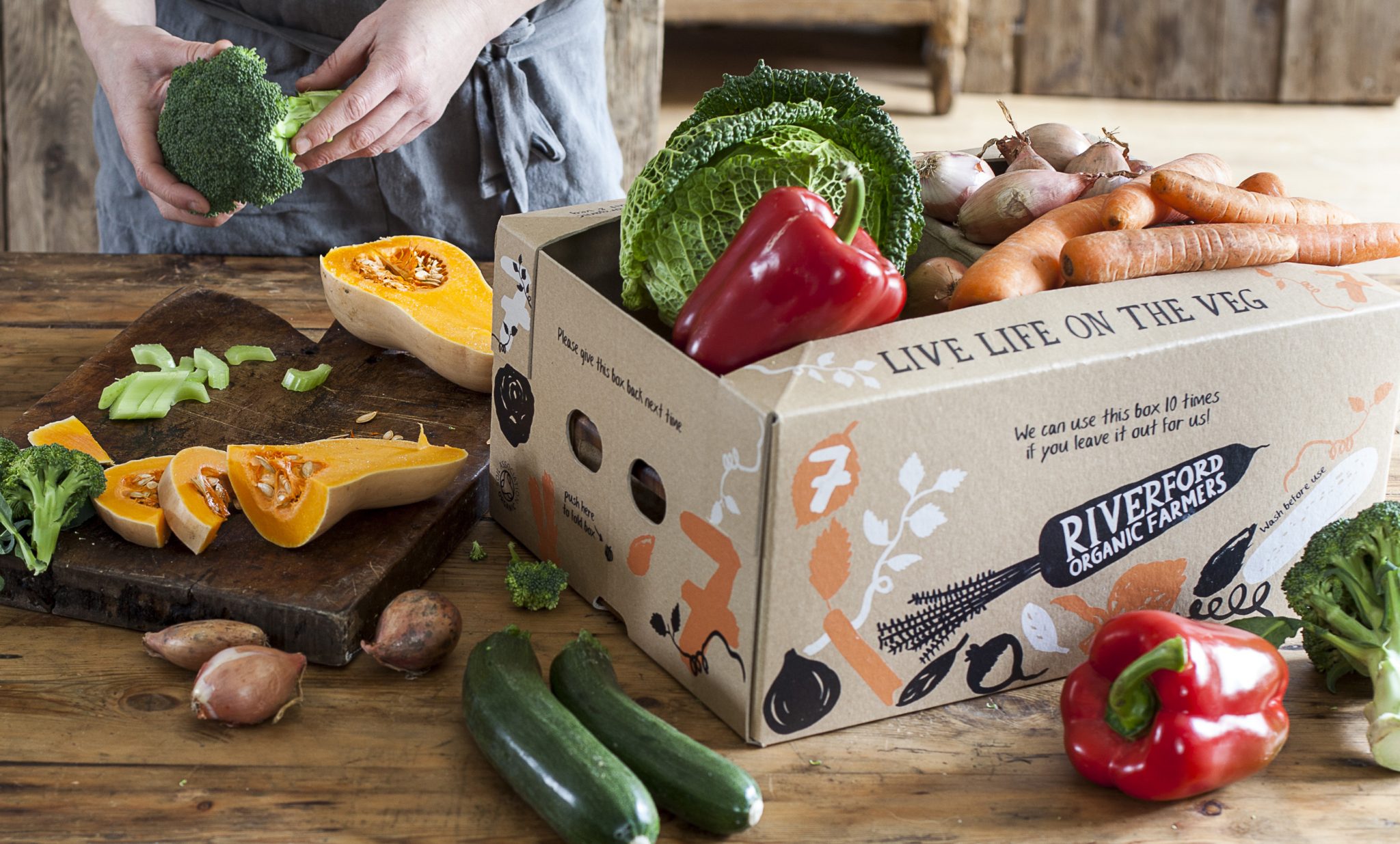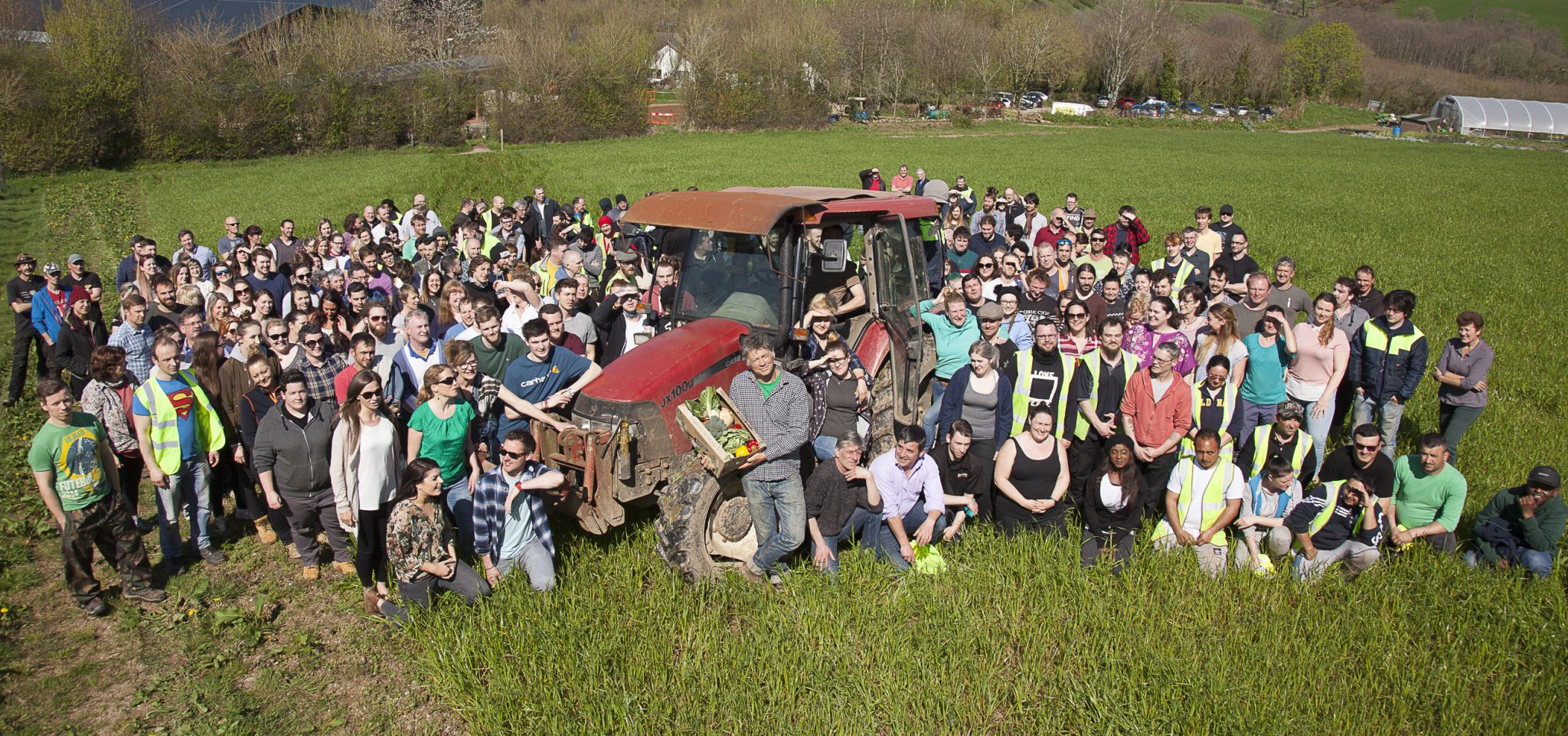Throughout Co-operatives Fortnight 2018, we’re sharing some of the brilliant stories from UK and international co-ops which show the #coopdifference in action: how, where and why co-operatives can make a difference to you and your communities.
Riverford Organic Farmers, which delivers food from regional farms to homes around the UK, has made the transition to employee-ownership.
The switch, which was supported by the Employee Ownership Association, sees the organisation 74% owned by its workforce, was made on 8 June, marked by a “huge” celebration party.
Founder Guy Singh-Watson retains a 26% share of the business and stays on as trustee, board member, shareholder and brand guardian. Riverford will now be governed by a board, staff council and trust, with the current day-to-day management team remaining in place.
The 650 new worker-owners own most of the land, and all the buildings and infrastructure, under the £6m deal, which is being funded by Triodos bank. Mr Singh-Watson can only sell his remaining share to the trust but said he has no plans to do so and “is excited about staying involved for the next chapter”.
Riverford, which began organic farming at a site in Devon in 1987 and six years later became one of the first organic veg box delivery schemes direct from farm to customers, said there would be no difference in the price or contents of produce boxes sold.
Writing on his blog, Mr Singh-Watson said: “Amongst all the signings, meetings and legal documentation, I am tearful, grumpy and awash with churning emotions – but doubt is not one of them.

“I am convinced most people are kinder, less greedy, more creative, more thoughtful and can contribute more and be more productive than our institutions allow them to demonstrate. The best indication of business efficiency (and most valid prediction of future success) is getting the best out of people while giving the most back; return on capital is a poor, short-term proxy.
“I want to be part of an organisation that helps us be the best version of ourselves – that facilitates and grows people, rather than undermining their humanity by appealing to ignoble sentiments, as capitalism too often does.”
Riverford, which now distributes nearly 50,000 boxes of produce a week and has a £60m turnover, is worth more than £20m. Mr Singh-Watson said he could have sold the firm to the highest bidder and put the money to good causes but favoured employee ownership. “I have nagging doubts about charity,” he explained, “and would prefer to embed the changes I want to see in everyday life.”
He added: “Time might prove me hopelessly idealistic, but I don’t think so; over the last year we have been working towards a more inclusive, human style of management, and the signs are so good that even our more militaristically minded managers are embracing the change.
“It feels as if an oppressive cloud is already lifting and a new dawn, full of exciting possibility, is revealing itself. In the end, the most critical factor is confidence: in each other and in our shared humanity; the confidence to be our whole selves, and not to wait for others to lead the way.”

Q&A: Riverford Organic Farmers
Why the change to employee ownership?
Riverford has always chosen to do business differently. Our decision to be employee owned is a natural step for a company committed to showing a more enlightened way. At a time when no-one was focused on organic, we farmed and sold organic produce. And now at a point when we might have opted to sell, we have chosen another less trodden path that we hope in time will become the norm.
This model embodies our confidence in the staff as the best equipped to take the business forward. We are excited about demonstrating, along with other EO businesses, how this model can deliver dividends on engagement and motivation; and how these in turn translate into commercial success allied with enduring values.
Guy was aware that he wouldn’t be around forever and his kids weren’t going to take the business on. Therefore, for the last few years, many options have been explored and rejected. VC buy-out, crowd funding, customer ownership and of course employee ownership. In the end, any external options were rejected because they simply don’t offer the security that the business will be run with long term values in mind.
What an Employee Ownership Trust model offers is the opportunity to lock in the values of the business for the long term in a way that is fair to all. In practice it also means that for franchisees, customers and suppliers little will change day to day.
Are all staff behind the decision?
Everyone is aware of the change that is coming. A good proportion are highly engaged and excited, but, as with most change, there are a good number who are taking a while to engage with and understand the change. We are working hard to communicate what the change will mean. On the whole, staff are supportive of the decision once they understand what it means, but there is some concern about its impact. We will continue to have conversations with staff at all levels and all areas of the business as we go through transition and beyond.
What changes will staff notice from day one?
The biggest shift will be one of mindset. Those businesses we have seen thrive are the ones where over time every single person in the company acts like, and feels like, an owner. While there are clear structures and ways of doing things, the big change is that everyone is in a position to hold each other to account every single day. So it’s less about top-down management, and more about each individual taking responsibility for their part in making the business succeed.
While it is not a magic pill, and it can’t happen in a single day, our hope is that everyone at Riverford feels listened to, feels that they can challenge us and that they are in this thing together. We would be looking for a shift in behaviour from the classic top-down adult-child dynamic to an adult-adult one. We are all in this together, and we all have to take responsibility together.
For the staff, one thing they will see much more of is communication – not just of the good bits like the profit share, but also of the tougher decisions a business has to make to move forwards. With everyone owning part of the company, that involves a level of transparency and responsibility that was not previously required. You share in the good news, and in the bad news together.
What percentage of profits will they now receive annually?
We will continue to share a minimum of 10% of profits with all employees. Our aspiration is that we can even increase the profit share but that is a decision that will be taken each year by the Board and Trustees. A benefit with moving into EO is that this profit share will now be tax-free.
What happens if the company makes a loss – will the staff lose money?
No. As staff will not be purchasing shares, they will not be exposed in this way.

Q&A: Guy Singh-Watson
What businesses inspired you to consider Employee Ownership?
My starting point was the Quaker movement – I have a lot of respect for the way they run business collaboratively. There are lots of forms of EO, with the best known probably being John Lewis, but while I greatly admire their success, I aspire to something more dynamic. My favourite example is probably Tiptree – they have a lovely long-term approach to business with an absolute determination to do things well – they still grow fruit themselves and are innovative in their growing techniques. They have a good level of staff engagement and are a lovely company in it for the long term, owned by the original family who share same views as me which are, essentially: if you already have £5m, what on earth are you going to do with another £5m? If you can forego the gin palace in Monte Carlo then imagine what good you could do with that money instead.
How much will you be involved in the business going forward?
I love it and want to be involved in it as long as possible, as long as the staff will have me; they will have the power to fire me once we become employee-owned. My involvement with the business currently stands at 80% of my time and may fall to 60% with EO transition, but I am a big character in the business and need to make room for others. I can’t be the face of the business (or the grumpy old man of the business) forever. Right now I regularly walk around the business until I find something to fix. I am trying to celebrate more and to impress upon our managers to do the same. Improvement is not always about going from really good to excellent, it can be about going from crap to average.
What worries you most about Riverford becoming employee-owned?
It’s not about the business going off in a direction I wouldn’t support or making bigger mistakes; my biggest fear is actual that we do nothing, and nothing changes, and we stand still just doing the same as what we are doing today. In a values-driven business, competence is even more important. You have to be better at what you do, more innovative in order to do that. Being a values-driven business does not give you an excuse not to be exceedingly good at everything we do.
How long will you stay involved in the business?
One of the reasons this model appealed was that it enabled me to stay involved in the business, primarily from a guardianship and ideas point of view. My aim is to be part of Riverford until my dying day. If that changes and I can’t be involved then the business will continue to thrive without me.

